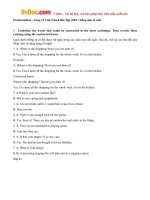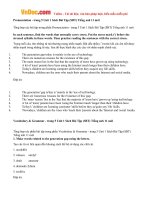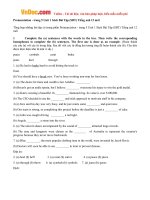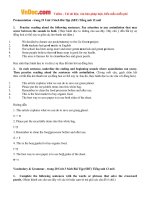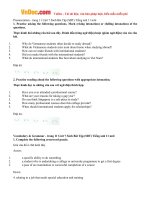Giải bài tập SBT Tiếng Anh lớp 11 chương trình mới Unit 1: The generation gap
Bạn đang xem bản rút gọn của tài liệu. Xem và tải ngay bản đầy đủ của tài liệu tại đây (285.91 KB, 10 trang )
VnDoc - Tải tài liệu, văn bản pháp luật, biểu mẫu miễn phí
Pronunciation - trang 5 Unit 1 Sách Bài Tập (SBT) Tiếng anh 11 mới
Tổng hợp các bài tập trong phần Pronunciation - trang 5 Unit 1 Sách Bài Tập (SBT) Tiếng anh 11 mới
In each sentence, find the words that normally carry stress. Put the stress mark (') before the
stressed syllable in these words. Then practise reading the sentences with the correct stress.
Trong mỗi câu, tìm những từ mà thường mang nhấn mạnh. Đặt dấu nhấn ( ') trước khi các âm tiết được
nhấn mạnh trong những từ này. Sau đó thực hành đọc các câu với nhấn mạnh chính xác.
1.
2.
3.
4.
5.
6.
The generation gap today is mainly in the use of technology.
There are numerous reasons for the existence of this gap.
The main reason lies in the fact that the majority of teens have grown up using technology.
A lot of teens' parents have been using the Internet much longer than their children have.
Today's children are learning computer skills before they acquire any life skills.
Nowadays, children are the ones who teach their parents about the Internet and social media.
Đáp án:
1.
2.
3.
4.
5.
6.
The generation 'gap to'day is 'mainly in the 'use of tech'nology.
There are 'numerous 'reasons for the e'xistence of this 'gap.
The 'main 'reason 'lies in the 'fact that the majority of 'teens have 'grown up 'using tech'nology.
A 'lot of 'teens' parents have been 'using the 'Internet much 'longer than their 'children have.
To'day's ’children are 'learning com'puter 'skills before they ac'quire any 'life 'skills.
'Nowadays, 'children are the 'ones who 'teach their 'parents about the 'Internet and 'social 'media.
Vocabulary & Grammar - trang 5 Unit 1 Sách Bài Tập (SBT) Tiếng anh 11 mới
Tổng hợp các phần bài tập trong phần Vocabulary & Grammar - trang 5 Unit 1 Sách Bài Tập (SBT)
Tiếng anh 11 mới
1. Make words related to the generation gap using the letters.
Tạo các từ có liên quan đến khoảng cách thế hệ sử dụng các chữ cái.
1. accdehlir
2. rnlueca
aimlyf
3. ebalt
amensnr
4. detenedx fylmia
5. tcnlifoc
Đáp án:
VnDoc - Tải tài liệu, văn bản pháp luật, biểu mẫu miễn phí
1. childcare
2. nuclear family
4. extended family
3. table manners
5. conflict
2. Complete the statements about the generation gap and the family rules with the words in 1.
Make changes to the word form, if necessary.
Hoàn thành các câu về khoảng cách thế hệ và các quy tắc gia đình với các từ trong 1. Thay đổi thể thức
từ, nếu cần.
Example:
When people live in a multi-generational family, there is often a generation gap.
1.
2.
3.
4.
5.
One disadvantage of living in a/an__________________ is that grandparents may see things
from different viewpoints.
Children living with both parents in a stable___________________ tend to be more confident
andindependent.
Some parents care a lot about the appropriate behaviour when having a meal with other people.
That is why they want to teach their children good__________________ from a very early age.
_______________ in multi-generational families are inevitable.
The biggest advantage of living in an extended family is that parents don't have to worry much
about _______________and housework.
Đáp án:
1. an extended family
4. Conflicts
2. nuclear family
3.table manners
5. childcare
3 Complete a mother's advice to her 16-year-old daughter, using should/shouldn't and
ought/oughtn't.
Hoàn thành lời khuyên của một người mẹ cho con gái 16 tuổi, sử dụng should/shouldn't và
ought/oughtn't.
1.
2.
3.
4.
5.
Your grandparents live far from us, so you________________ talk to them on the phone
regularly.
You are going to a concert, so you________________ to wear your old jeans.
You_______________ stare at the computer screen for too long. It is really bad for your
eyesight.
You________________ to talk to your grandparents more often so that you can understand them
better.
You_____��������������������������������������������������������������������������������������������������������������������������������������������������������������������������������������������������������������������������������������������������������������������������������������������������������������������������������������������������������������������������������������������������������������������������������������������������������������������������������������������������������������������������������������������������������������������������������������������������������������������������������������������������������������������������������������������������������������������������������������������������������������������������������������������������������������������������������������������������������������������������������������������������������������������������������������������������������������������������������������������������������������������������������������������������������������������������������������������������������������������������������������������������������������������������������������������������������������������������������������������������������������������������������������������������������������������������������������������������������������������������������������������������������������������������������������������������������������������������������������������������������������������������������������������������������������������������������������������������������������������������������������������������������������������������������������������������������������������������������������������������������������������������������������������������������������������������������������������������������������������������������������������������������������������������������������������������������������������������������������������������������������������������������������������������������������������������������������������������������������������������������������������������������������������������������������������������������������������������������������������������������������������������������������������������������������������������������������������������������������������������������������������������������������������������������������������������������������������������������������������������������������������������������������������������������������������������������������������������������������������������������������������������������������������������������������������������������������������������������������������������������������������������������������������������������������������������������������������������������������������������������������������������������������������������������������������������������������������������������������������������������������������������������������������������������������������������������������������������������������������������������������������������������������������������������������������������������������������������������������������������������������������������������������������������������������������������������������������������������������������������������������������������������������������������������������������������������������������������������������������������������������������������������������������������������������������������������������������������������������������������������������������������������������������������������������������������������������������������������������������������������������������������������������������������������������������������������������������������������������������������������������������������������������������������������������������������������������������������������������������������������������������������������������������������������������������������������������������������������������������������������������������������������������������������������������������������������������������������������������������������������������������������������������������������������������������������������������������������������������������������������������������������������������������������������������������������������������������������������������������������������������������������������������������������������������������������������������������������������������������������������������������������������������������������������������������������������������������������������������������������������������������������������������������������������������������������������������������������������������������������������������������������������������������������������������������������������������������������������������������������������������������������������������������������������������������������������������������������������������������������������������������������������������������������������������������������������������������������������������������������������������������������������������������������������������������������������������������������������������������������������������������������������������������������������������������������������������������������������������������������������������������������������������������������������������������������������������������������������������������������������������������������������������������������������������������������������������������������������������������������������������������������������������������������������������������������������������������������������������������������������������������������������������������������������������������������������������������������������������������������������������������������������������������������������������������������������������������������������������������������������������������������������������������������������������������������������������������������������������������������������������������������������������������������������������������������������������������������������������������������������������������������������������������������������������������������������������������������������������������������������������������������������������������������������������������������������������������������������������������������������������������������������������������������������������������������������������������������������������������������������������������������������������������������������������������������������������������������������������������������������������������������������������������������������������������������������������������������������������������������������������������������������������������������������������������������������������������������������������������������������������������������������������������������������������������������������������������������������������������������������������������������������������������������������������������������������������������������������������������������������������������������������������������������������������������������������������������������������������������������������������������������������������������������������������������������������������������������������������������������������������������������������������������������������������������������������������������������������������������������������������������������������������������������������������������������������������������������������������������������������������������������������������������������������������������������������������������������������������������������������������������������������������������������������������������������������������������������������������������������������������������������������������������������������������������������������������������������������������������������������������������������������������������������������������������������������������������������������������������������������������������������������������������������������������������������������������������������������������������������������������������������������nh dục và ma túy, những điều bị tránh trong các cuộc đối thoại trong gia đình
trong quá khứ.
More and more parents and children have found some common interests.
Ngày càng có nhiều cha mẹ và trẻ em đã tìm thấy một số sở thích chung.
Because children may have less respect for their parents and the older generations.
Bởi vì trẻ em có thể ít tôn trọng cha mẹ và các thế hệ lớn tuổi hơn.
Speaking - trang 9 Unit 1 Sách bài tập (SBT) Tiếng anh 11 mới
Tổng hợp các phần bài tập trong phần Speaking - trang 9 Unit 1 Sách bài tập (SBT) Tiếng anh 11 mới
1. Trang is asking Giang about her family. In pairs, practise reading their conversation aloud.
Trang đang hỏi Giang về gia đình bạn ấy. Theo cặp, thực hành đọc to cuộc hội thoại.
Trang: Do you live in a nuclear or an extended family?
Giang: I only live with my parents and my older brother. My grandparents live in their own flat nearby.
Trang: Is there a generation gap in your family?
Giang:Not really. My parents are very youthful in their personality and appearance. They are also very
understanding. But sometimes I come into conflict with my brother.
Trang:What do you argue about?
Giang:Actually, my brother and I just argue about trivial things such as whose turn it is to do the
washing-up or clean the floor.
Trang:Are there family rules in your house?
Giang:Yes, we had a discussion and agreed on 10 rules. My mother had them printed on a large-size
sheet of paper and stuck it on the door of my bedroom. I can see the rules whenever I want.
Trang:Do you want to follow in your parents'footsteps?
Giang:I don't think so. As an accountant, my mother is very good with numbers, but I'm not. I like
travelling and outdoor activities, so I want to become a tour guide.
2
Summarise the information about Giang and practise talking about her to a partner. Use the
guide questions below.
VnDoc - Tải tài liệu, văn bản pháp luật, biểu mẫu miễn phí
Tóm tắt thông tin về Giang và thực hành nói về cô ấy với một người bạn. Sử dụng các câu hỏi hướng
dẫn bên dưới.
What type of family does Giang live in? Who does she live with? What are her parents like? Is ther
generation gap in her family? What do Giang and her brother often argue about? Does she want to foil in
her parents' footsteps? Why/Why not?
Gợi ý trả lời:
Giang lives in a nuclear family with her parents and an older brother. There isn't a generation gap i her
family because her parents are very youthful in their personality and appearance. They are als very
understanding. There are family rules in Giang's house, but sometimes she and her brother argu about
trivial things such as whose turn it is to wash up or clean the floor. Giang doesn't want to be a accountant
like her mother. She likes travelling and outdoor activities, so she wants to become a tour guide.
3 Work in pairs. Practise asking and answering the questions in 1.
Làm việc theo cặp. Thực hành hỏi và trả lời các câu hỏi trong bài 1.
Các học sinh thực hiện phân vai, hỏi và trả lời các câu hỏi.
4 One of your close friends is having an argument with his/ her parents. Read his/ her problems
ar give him/ her advice, using the structures in the Useful language box.
Một trong những người bạn thân của bạn có một cuộc cãi cọ với bố/ mẹ của mình. Đọc các vấn đề
và cho anh/ cô ấy lời khuyên, bằng cách sử dụng các cấu trúc trong hộp Ngôn ngữ hữu ích.
Gợi ý hướng dẫn:
I think you should have a serious talk with your parents and tell them what you think.
I don't think you ought to follow in your parents' footsteps.
VnDoc - Tải tài liệu, văn bản pháp luật, biểu mẫu miễn phí
Tôi nghĩ bạn nên nói chuyện nghiêm túc với bố mẹ và nói với họ những gì bạn nghĩ.
Tôi không nghĩ rằng bạn nên theo bước chân cha mẹ bạn.
Writing - trang 10 Unit 1 Sách Bài Tập (SBT) Tiếng anh 11 mới
Tổng hợp các bài tập trong phần Writing - trang 10 Unit 1 Sách Bài Tập (SBT) Tiếng anh 11 mới
1 Complete the sentences without changing their meanings.
Hoàn thành các câu mà không làm thay đổi nghĩa của chúng.
1.My parents never let me forget to do my homework.
My parents always remind____________.
2.They think that it is a good idea for me to do voluntary work.
They think that I__________________.
3. They always refuse to allow me to stay overnight at my friend's house.
They never let__________________.
4. They insist that I should come home at 9 o'clock every night.
They make__________________.
5. My mother expects me to work as a teacher like her.
It is my mother's wish that I should__________________.
6. It is very important for us to do well at school.
We must__________________.
7. I can go out with my friends at the weekend.
I am allowed__________________.
8. It is not necessary for me to agree with everything my parents say.
I don't have__________________.
Đáp án:
1.
2.
3.
4.
5.
6.
7.
8.
My parents always remind me to do my homework.
They think that I should/ ought to do voluntary work.
They never let me stay overnight at my friend's house.
They make me come home at 9 o'clock every night.
It is my mother's wish that I should work as a teacher like her.
We must do well at school.
I am allowed to go out with my friends at the weekend.
I don't have to agree with everything my parents say.
VnDoc - Tải tài liệu, văn bản pháp luật, biểu mẫu miễn phí
2
You've got a pen pal who is interested in knowing more about family rules for teenagers that
are most common in Viet Nam. Use the words and phrases to complete a letter of about 160-180
words to him/ her. Add more words, if necessary.
Bạn có một người bạn qua thư muốn tìm hiểu thêm về các quy tắc gia đình dành cho thanh thiếu
niên phổ biến nhất ở Việt Nam. Sử dụng các từ và cụm từ để hoàn thành một bức thư khoảng
160-180 từ cho anh ấy/ cô ấy. Thêm từ, nếu cần thiết.
10 Tran Huu Due St.
NamTu Liem Dist., Ha Noi
March 1st, 20_______
Dear Cynthia,
I/ so glad/ know that you're interested/ family rules/ teenagers in Viet Nam. In fact, each family may
apply certain rules/ their children, depending/ the parents' perceptions/ what is necessary. However, most
parents expect their children/ follow these three rules.
First, parents often remind their children/ show respect/ the elderly/ greeting them or helping them
whenever possible. The parents themselves set/ good example/ their children/ looking after their
old-aged parents/ providing both emotional/ financial support.
Second, teenagers/ Viet Nam are expected/ help their parents/ the housework and other home duties.
Cooking dinners and washing up/the most common duties/ teenagers. Those who live/the countryside
are also required/ work on the farm/ help their parents.
Finally, most parents want their children/ do well at school/ the hope that they will have a bright future.
Then they may have a better chance/ help their parents/ return.
Life/ changing fast, and family rules/ also changing accordingly. However, I still believe/ the three
above- mentioned rules/ remain unchanged/ our culture.
I hope/find this information useful. If you need further information, feel free/ ask me and I will try my
best/ help you.
Best wishes,
Kim
Gợi ý đáp án:
10 Tran Huu Due St.
Nam Tu Liem Dist., Ha Noi
March 1st, 20_______
Dear Cynthia,
I am so glad to know that you're interested in family rules for teenagers in Viet Nam. In fact, each
family may apply certain rules for their children, depending on the parents' perceptions of what is
necessary. However, most parents expect their children to follow these three rules.
VnDoc - Tải tài liệu, văn bản pháp luật, biểu mẫu miễn phí
First, parents often remind their children to show respect for the elderly by greeting them or helping
them whenever possible. The parents themselves set a good example for their children by looking after
their old-aged parents and providing both emotional and financial support.
Second, teenagers in Viet Nam are expected to help their parents with the housework and other home
duties. Cooking dinners and washing up are the most common duties for teenagers. Those who live in
the countryside are also required to work on the farm to help their parents.
Finally, most parents want their children to do well at school in the hope that they will have a bright
future. Then they may have a better chance to help their parents in return.
Life is changing fast, and family rules are also changing accordingly. However, I still believe that the
three above-mentioned rules will remain unchanged in our culture.
I hope you find this information useful. If you need further information, feel free to ask me and I will try
my best to help you.
Best wishes,
Kim


